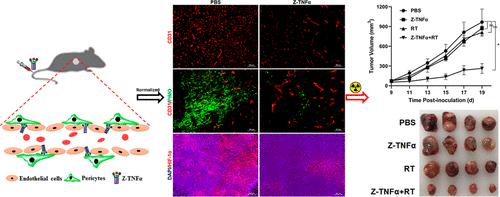当前位置:
X-MOL 学术
›
Mol. Pharmaceutics
›
论文详情
Our official English website, www.x-mol.net, welcomes your feedback! (Note: you will need to create a separate account there.)
PDGFRβ-Antagonistic Affibody-Mediated Tumor-Targeted Tumor Necrosis Factor-Alpha for Enhanced Radiotherapy in Lung Cancer
Molecular Pharmaceutics ( IF 4.9 ) Pub Date : 2024-02-16 , DOI: 10.1021/acs.molpharmaceut.3c00869 Xiaohui Tang 1 , Jie Chen 2 , Zhenxiong Zhao 3 , Jie Liu 1 , Ranfei Yu 1 , Kunlong Zhao 1 , Fei Wang 1 , Yang Li 1 , Baoqing Tian 1 , Dandan Yuan 1 , Yuguo Liu 1 , Qing Fan 1
Molecular Pharmaceutics ( IF 4.9 ) Pub Date : 2024-02-16 , DOI: 10.1021/acs.molpharmaceut.3c00869 Xiaohui Tang 1 , Jie Chen 2 , Zhenxiong Zhao 3 , Jie Liu 1 , Ranfei Yu 1 , Kunlong Zhao 1 , Fei Wang 1 , Yang Li 1 , Baoqing Tian 1 , Dandan Yuan 1 , Yuguo Liu 1 , Qing Fan 1
Affiliation

|
The morbidity and mortality of lung cancer are still the highest among all malignant tumors. Radiotherapy plays an important role in clinical treatment of lung cancer. However, the effect of radiotherapy is not ideal due to the radiation resistance of tumor tissues. Abnormalities in tumor vascular structure and function affect blood perfusion, and oxygen transport is impeded, making tumor microenvironment hypoxic. Tumor hypoxia is the major cause of radiotherapy resistance. By promoting tumor vessel normalization and enhancing vascular transport function, tumor hypoxia can be relieved to reduce radiotherapy resistance and increase tumor radiotherapy sensitivity. In our previous study, a pericytes-targeted tumor necrosis factor alpha (named Z-TNFα) was first constructed and produced by genetically fusing the platelet-derived growth factor receptor β (PDGFRβ)-antagonistic affibody (ZPDGFRβ) to the TNFα, and the Z-TNFα induced normalization of tumor vessels and improved the delivery of doxorubicin, enhancing tumor chemotherapy. In this study, the tumor vessel normalization effect of Z-TNFα in lung cancer was further clarified. Moreover, the tumor hypoxia improvement and radiosensitizing effect of Z-TNFα were emphatically explored in vivo. Inspiringly, Z-TNFα specifically accumulated in Lewis lung carcinoma (LLC) tumor graft and relieved tumor hypoxia as well as inhibited HIF-1α expression. As expected, Z-TNFα significantly increased the effect of radiotherapy in mice bearing LLC tumor graft. In conclusion, these results demonstrated that Z-TNFα is also a promising radiosensitizer for lung cancer radiotherapy.
中文翻译:

PDGFRβ-拮抗 Affibody 介导的肿瘤靶向肿瘤坏死因子-α 用于肺癌的增强放疗
肺癌的发病率和死亡率仍居所有恶性肿瘤中最高。放射治疗在肺癌的临床治疗中发挥着重要作用。但由于肿瘤组织对放射线的抵抗力,放射治疗的效果并不理想。肿瘤血管结构和功能异常影响血液灌注,氧输送受阻,使肿瘤微环境缺氧。肿瘤缺氧是放疗抵抗的主要原因。通过促进肿瘤血管正常化、增强血管运输功能,缓解肿瘤缺氧,降低放疗抵抗,提高肿瘤放疗敏感性。在我们之前的研究中,首先通过将血小板源性生长因子受体β(PDGFRβ)-拮抗亲和体(Z PDGFRβ)与TNFα进行基因融合,构建并产生了周细胞靶向的肿瘤坏死因子α(命名为Z- TNFα),并且Z-TNFα 诱导肿瘤血管正常化并改善阿霉素的输送,从而增强肿瘤化疗。本研究进一步阐明了Z-TNFα在肺癌中的肿瘤血管正常化作用。此外,在体内重点探讨了Z-TNFα的肿瘤缺氧改善和放射增敏作用。令人鼓舞的是,Z-TNFα 特异性地积聚在 Lewis 肺癌 (LLC) 肿瘤移植物中,缓解肿瘤缺氧并抑制 HIF-1α 表达。正如预期的那样,Z-TNFα 显着增强了携带 LLC 肿瘤移植物的小鼠的放射治疗效果。总之,这些结果表明 Z-TNFα 也是一种有前途的肺癌放射治疗放射增敏剂。
更新日期:2024-02-16
中文翻译:

PDGFRβ-拮抗 Affibody 介导的肿瘤靶向肿瘤坏死因子-α 用于肺癌的增强放疗
肺癌的发病率和死亡率仍居所有恶性肿瘤中最高。放射治疗在肺癌的临床治疗中发挥着重要作用。但由于肿瘤组织对放射线的抵抗力,放射治疗的效果并不理想。肿瘤血管结构和功能异常影响血液灌注,氧输送受阻,使肿瘤微环境缺氧。肿瘤缺氧是放疗抵抗的主要原因。通过促进肿瘤血管正常化、增强血管运输功能,缓解肿瘤缺氧,降低放疗抵抗,提高肿瘤放疗敏感性。在我们之前的研究中,首先通过将血小板源性生长因子受体β(PDGFRβ)-拮抗亲和体(Z PDGFRβ)与TNFα进行基因融合,构建并产生了周细胞靶向的肿瘤坏死因子α(命名为Z- TNFα),并且Z-TNFα 诱导肿瘤血管正常化并改善阿霉素的输送,从而增强肿瘤化疗。本研究进一步阐明了Z-TNFα在肺癌中的肿瘤血管正常化作用。此外,在体内重点探讨了Z-TNFα的肿瘤缺氧改善和放射增敏作用。令人鼓舞的是,Z-TNFα 特异性地积聚在 Lewis 肺癌 (LLC) 肿瘤移植物中,缓解肿瘤缺氧并抑制 HIF-1α 表达。正如预期的那样,Z-TNFα 显着增强了携带 LLC 肿瘤移植物的小鼠的放射治疗效果。总之,这些结果表明 Z-TNFα 也是一种有前途的肺癌放射治疗放射增敏剂。



























 京公网安备 11010802027423号
京公网安备 11010802027423号